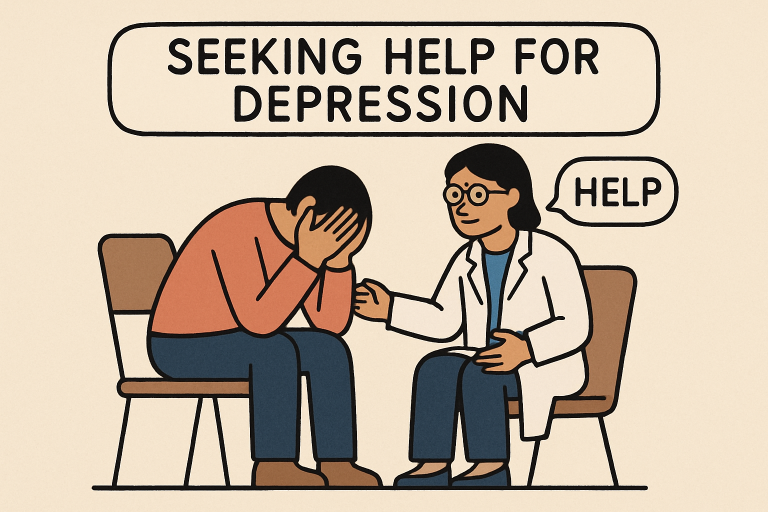Key Takeaways
- Early recognition of depressive symptoms is essential for effective intervention and successful recovery.
- Prolonged or severe symptoms, inability to cope, and suicidal thoughts are critical reasons to seek a depression specialist.
- Consulting a qualified mental health professional leads to accurate diagnosis, tailored treatment plans, and ongoing support focused on long-term wellness.
- Finding the right specialist demands thoughtful research, attention to treatment preferences, and commonly a referral from a primary care provider to ensure a trusted match.
Depression is a complex and pervasive mental health condition that reaches far beyond the scope of temporary sadness or short bouts of feeling low. Its impact extends into how you think, act, relate to others, and function in everyday life. Knowing when to seek help is a pivotal step on the journey to recovery—one that can profoundly alter the course of the illness. For individuals experiencing symptoms themselves, or for those supporting a loved one, recognizing the need for assistance from a depression doctor can provide a turning point, ushering in hope, new coping strategies, and the reassurance that you do not have to face depression alone.
Acknowledging the signs of depression early, gaining knowledge about the condition’s many forms, and identifying when symptoms cross the line into needing professional intervention are empowering acts of self-care. Not addressing the problem in its initial stages may allow depression to grow in intensity and disrupt your life more deeply. Conversely, acting early increases the likelihood of quicker recovery and restores functionality, showing that proactive steps are more than worth the effort.
Understanding Depression
Depression is a complex mental health condition that varies widely from person to person. It includes several types, such as major depressive disorder, persistent depressive disorder (dysthymia), and seasonal affective disorder, each with unique symptoms and patterns. These conditions can deeply affect daily functioning, emotional well-being, and personal relationships. According to the American Psychiatric Association, understanding the different forms of depression is essential for recognizing symptoms and seeking timely help. Early identification often leads to better outcomes and less prolonged suffering.
Common Symptoms of Depression
- Ongoing feelings of sadness, emptiness, or hopelessness that do not subside
- Marked loss of interest or pleasure in hobbies, socializing, or activities that once brought happiness
- Notable changes in appetite, which may lead either to weight gain or weight loss without clear physical reasons
- Consistent trouble sleeping or, conversely, sleeping far more than is typical
- Chronic fatigue or a sense of depleted energy, sometimes accompanied by slowed physical or cognitive functioning
- Difficulty with concentration, memory, or making even simple decisions
- Overwhelming feelings of guilt, worthlessness, or self-blame that are disproportionate to the situation
- Ongoing thoughts related to death, self-harm, or suicide

Signs It’s Time to Seek Professional Help
- Symptoms Lasting More Than Two Weeks: Persistent sadness, hopelessness, or loss of motivation that disrupts daily life for more than two weeks should be addressed by a professional.
- Overwhelmed Coping Mechanisms: When usual coping strategies like socializing or hobbies no longer bring relief and everyday tasks become overwhelming, added support is needed.
- Physical Health Changes: Unexplained aches, digestive issues, or chronic pain that don’t respond to typical medical treatments may point to underlying depression.
- Self-Harm or Suicidal Thoughts: Any thoughts of self-harm or suicide, no matter how fleeting, require immediate help from a healthcare provider or emergency service.
- Misuse of Substances: Using drugs or alcohol to escape emotional pain signals a deeper struggle with depression and the need for professional intervention.
Benefits of Consulting a Depression Specialist
Seeking help from a licensed mental health professional can greatly improve the outlook for individuals with depression. Specialists provide tailored and expert guidance to promote recovery and long-term wellness.
- Accurate Assessment & Diagnosis: Experts use evidence-based tools to distinguish depression from other mental health conditions and assess severity.
- Personalized Care Plans: Treatment may include therapy, medications, and lifestyle changes tailored to each person’s specific needs.
- Continued Support & Relapse Prevention: Ongoing monitoring and support help prevent relapse, allowing timely adjustments and skill-building to maintain progress.
Taking this step toward professional care is often the turning point toward meaningful recovery and a healthier, more hopeful future.
How to Find the Right Specialist
Selecting a mental health specialist is an essential component of achieving long-term well-being. Start by reaching out to your primary care physician, who can provide a referral to a trusted Depression Doctor or therapist, laying a foundation of confidence and trust in the process. A referral also ensures that your care is coordinated, especially if you have other medical conditions.
- Ask for a Referral: Your doctor can recommend reputable depression specialists, streamlining your search and giving you confidence that you are seeing someone respected in the field.
- Check Credentials and Experience: Take time to confirm that your chosen professional holds appropriate licensure and has specific experience treating depression. Research their education, certifications, special interests, and even patient feedback when available for extra assurance.
- Consider Therapeutic Preferences: There are multiple types of therapy, including cognitive-behavioral, psychodynamic, and medication-focused treatments. Discuss available options with your prospective specialist, and don’t hesitate to voice your own preferences about therapy style or treatment goals to find the best mutual fit.
- Evaluate Communication and Comfort: The relationship with your depression doctor or therapist is crucial to healing. Choose someone who listens without judgment, communicates clearly, and who you feel comfortable talking to. Trust and a collaborative rapport are foundational for effective therapy.
For additional support, education, and vetted resources on depression, the National Institute of Mental Health offers invaluable guides and locator tools for depression treatment. Taking the time to carefully research and connect with the right provider can significantly improve your prognosis, helping you to achieve meaningful and lasting recovery.
Investing this effort in choosing a suitable specialist maximizes your potential for long-term health and enhances your journey toward overall wellness.
Conclusion
Depression doesn’t have to remain a private battle. By learning the difference between life’s temporary setbacks and conditions requiring intervention—and by reaching out to a qualified Depression Doctor at the right time—you set the stage for hope, healing, and a renewed sense of possibility. Early recognition, individualized care, and supportive professional relationships are all critical tools in overcoming depression and cultivating a more satisfying, functional life. If you or someone you know is contending with signs of depression, remember that help is both available and effective—now is always the right time to take the first step toward well-being.
The Editorial Team at Healthcare Business Today is made up of experienced healthcare writers and editors, led by managing editor Daniel Casciato, who has over 25 years of experience in healthcare journalism. Since 1998, our team has delivered trusted, high-quality health and wellness content across numerous platforms.
Disclaimer: The content on this site is for general informational purposes only and is not intended as medical, legal, or financial advice. No content published here should be construed as a substitute for professional advice, diagnosis, or treatment. Always consult with a qualified healthcare or legal professional regarding your specific needs.
See our full disclaimer for more details.







